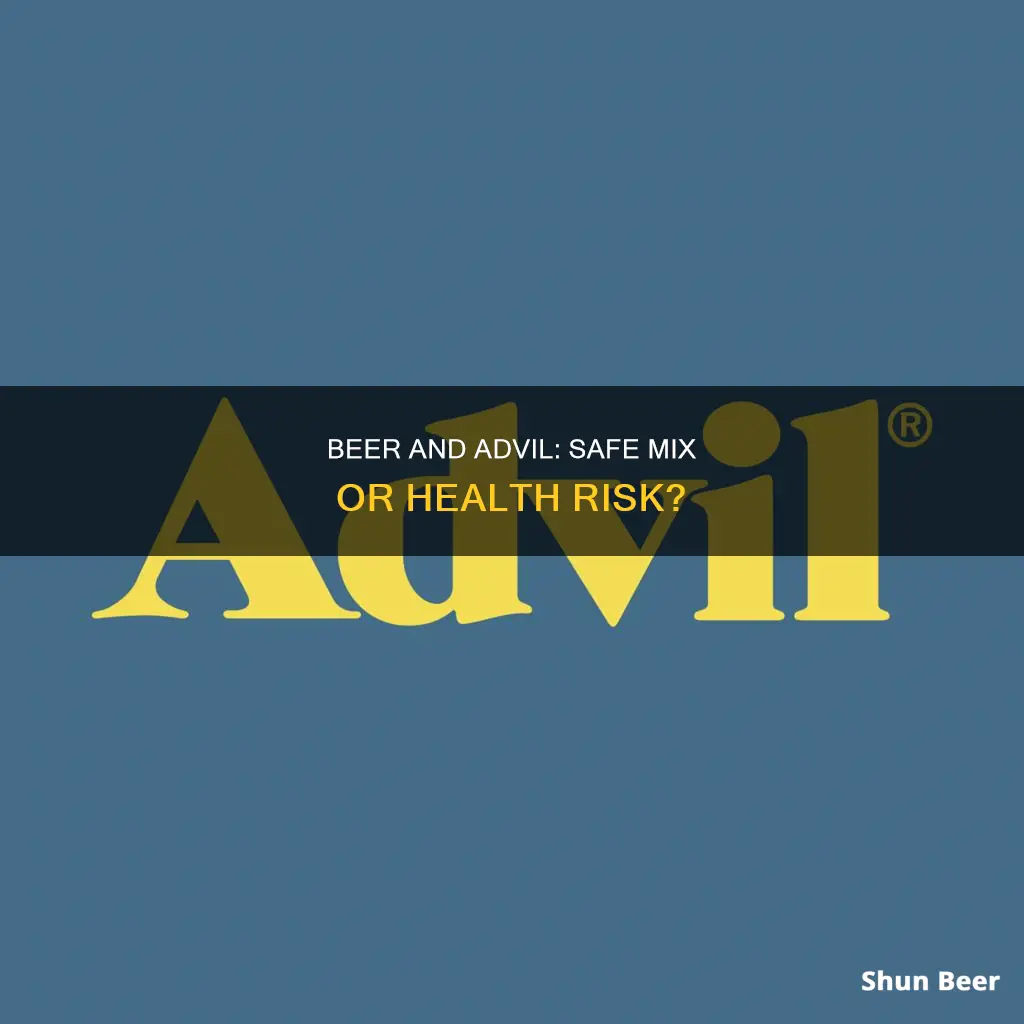
Drinking alcohol while taking Advil is generally not recommended, as it can lead to several harmful side effects. Both Advil and alcohol irritate the stomach and digestive tract, increasing the risk of ulcers and gastrointestinal bleeding. Additionally, Advil and alcohol can both cause kidney damage, and combining them may lead to more severe kidney problems. Mixing the two substances can also result in impaired responsiveness and decreased alertness, which can be dangerous if driving or operating machinery. While consuming a small amount of alcohol while taking Advil is considered safe for most people, moderate to excessive drinking can increase the side effects of Advil, and people with underlying medical conditions are at higher risk of complications.
| Characteristics | Values |
|---|---|
| Risk of gastrointestinal bleeding | Increased |
| Risk of kidney damage | Increased |
| Risk of liver damage | Increased |
| Risk of cardiovascular problems | Increased |
| Risk of drowsiness | Increased |
| Risk of impaired responsiveness | Increased |
| Risk of decreased alertness | Increased |
| Risk of slower reaction times | Increased |
| Risk of ulcers | Increased |
What You'll Learn

Increased risk of gastrointestinal bleeding
Combining Advil and alcohol can increase your risk of gastrointestinal bleeding. This is because both substances irritate the stomach and digestive tract, and combining them can further increase the risk of ulcers and bleeding from the digestive tract.
Ibuprofen, the active ingredient in Advil, is a nonsteroidal anti-inflammatory drug (NSAID) that can irritate the lining of your stomach and cause inflammation. This can lead to a gastric or intestinal perforation, which can be fatal. Long-term use of ibuprofen, especially in high doses, increases the risk of stomach ulcers and bleeding.
Alcohol is also a digestive irritant, and even one drink can accelerate acid production in your stomach. This increase in acid decreases the protection of your digestive tract, damaging the delicate gastrointestinal tissue. Drinking alcohol, therefore, increases the risk of gastrointestinal bleeding caused by ibuprofen.
The risk of gastrointestinal bleeding is higher for people who take ibuprofen regularly and those who drink heavily. Older adults are at a higher risk of experiencing gastrointestinal bleeding, with one source stating that they are four times more likely to experience it if they are taking NSAIDs. Men are also more likely to experience gastrointestinal bleeding than women.
Symptoms of gastrointestinal bleeding include red, black, or tarry stools, sudden nausea or loss of appetite, and vomiting blood or vomit that resembles coffee grounds. If you notice any of these symptoms, seek medical help immediately.
Low-Carb Diet and Beer: Is It Possible?
You may want to see also

Higher chance of kidney damage
Drinking beer while taking Advil can lead to a higher chance of kidney damage. Advil, or ibuprofen, is a nonsteroidal anti-inflammatory drug (NSAID) that is used to treat pain, inflammation, and fever. While it is a convenient over-the-counter medication, mixing it with alcohol can have harmful side effects.
Both Advil and alcohol irritate the stomach and digestive tract, increasing the risk of ulcers and gastrointestinal (GI) bleeding. This risk is heightened when combining the two substances, especially for older adults. Additionally, Advil can cause kidney damage, and alcohol puts further strain on the kidneys as they work to filter it out of the body. The National Kidney Foundation states that regular heavy drinking doubles the risk of chronic kidney disease. Consuming Advil and alcohol together can therefore significantly increase the risk of kidney damage and other severe health issues.
The risk of kidney damage from combining Advil and alcohol is heightened for those with existing kidney issues or certain health conditions. People with underlying medical conditions, such as liver or kidney disease, high blood pressure, or heart failure, are at the highest risk of adverse effects. Additionally, those who take ibuprofen regularly and those who drink heavily are more susceptible to complications.
To minimize the risk of kidney damage, it is recommended to wait at least 10 hours after taking a dose of ibuprofen before consuming alcohol. However, it is important to note that stopping ibuprofen just to drink alcohol is not advised, especially for those taking it regularly for a chronic health condition. If you are taking ibuprofen for long-term treatment or have concerns about mixing it with alcohol, it is best to consult your healthcare provider for personalized advice.
Beer and Coronavirus: What's Safe to Drink?
You may want to see also

Potential liver damage
Combining Advil and alcohol can increase your risk of liver issues, gastrointestinal bleeding, and kidney problems. Advil, or ibuprofen, is a nonsteroidal anti-inflammatory drug (NSAID) that is used to treat pain, swelling, and fever. While taking the recommended dose of ibuprofen with alcohol occasionally is typically not harmful, doing so regularly can negatively impact your stomach and kidneys.
Ibuprofen can irritate the lining of the stomach, and when combined with alcohol, this risk is increased. This irritation can lead to gastrointestinal (GI) bleeding or peptic ulcer disease. The risk of GI bleeding is especially high for older adults, who are four times more likely than younger adults to experience this complication.
Alcohol is known to cause liver damage, especially with heavy or chronic consumption. While ibuprofen alone is typically not hard on the liver, laboratory studies suggest that when combined with alcohol, ibuprofen may increase the risk of liver damage. This damage can cause a backflow of bile into the liver, as well as liver cell damage. Symptoms of liver damage include extreme weakness and fatigue, abdominal pain on the left side under the ribs, and jaundice or yellowing of the skin and eyes.
It is important to note that people with liver disease may be at an increased risk of liver injury when taking certain medications, including ibuprofen. Additionally, those with pre-existing liver disease who develop liver injury from a medication may experience more severe damage than a healthy person. Therefore, it is recommended to consult a physician before taking ibuprofen if you have liver cirrhosis or any other concerns.
To minimize the risk of liver damage, it is generally best to avoid combining ibuprofen and alcohol. If you are taking ibuprofen regularly, it is advised to wait at least 10 hours after taking a dose before consuming alcohol. However, if you have liver problems, it may take up to 17 hours for your body to clear ibuprofen.
Yogurt and Beer: A Safe Pairing or Not?
You may want to see also

Increased drowsiness
Drinking alcohol and taking Advil (ibuprofen) can increase drowsiness. Both alcohol and ibuprofen can cause drowsiness on their own, but when combined, they can intensify tiredness. This can lead to extreme sleepiness and impaired functioning. If you are drinking alcohol, it is important to avoid driving, as alcohol already slows down reaction time and impairs coordination. The combination of alcohol and ibuprofen can further increase the risk of accidents or harm to yourself or others.
The increased drowsiness caused by mixing alcohol and ibuprofen can result in a lack of alertness and impaired responsiveness. This can affect your attention, making it more likely to have slower reaction times, driving distractions, and falling asleep in dangerous situations. The relaxing effects of both substances can also increase the risk of not paying attention while driving, which is already dangerous when drinking alcohol.
The combination of alcohol and ibuprofen can also lead to other serious side effects, including gastrointestinal bleeding, kidney damage, and liver damage. These risks are higher for older adults and individuals with certain health conditions, such as kidney or liver disease. It is recommended to consult with a healthcare provider to understand your specific risks and whether it is safe to consume alcohol while taking ibuprofen.
Hunting and Drinking Beer: Is It Legal?
You may want to see also

Risk of cardiovascular problems
Combining Advil and alcohol can have serious cardiovascular implications. Advil, or ibuprofen, is a nonsteroidal anti-inflammatory drug (NSAID) that reduces pain, swelling, and fever. NSAIDs are associated with an increased risk of cardiovascular events such as heart attacks and strokes, especially with prolonged use. When combined with alcohol, these risks are heightened.
Both Advil and alcohol can negatively impact the heart. Heavy or regular alcohol consumption is linked to heart-related issues such as coronary artery disease, heart failure, high blood pressure, and an increased risk of heart attacks. Similarly, ibuprofen, especially at higher doses, can increase the risk of heart problems, including heart attacks. When combined, Advil and alcohol may elevate the risk of cardiovascular complications beyond the individual risks posed by each substance.
The interaction between Advil and alcohol can also lead to other issues that indirectly impact cardiovascular health. For example, this combination can cause gastrointestinal bleeding and increase the risk of kidney damage. These complications can further contribute to cardiovascular problems.
It is important to note that the risks associated with mixing Advil and alcohol are higher for certain individuals, including older adults, men, and those with existing health conditions such as kidney disease or high blood pressure. Additionally, the likelihood of complications increases with higher doses of Advil and heavier alcohol consumption.
To minimize the risk of cardiovascular problems, it is generally recommended to avoid combining Advil and alcohol. If you are taking Advil, it is advisable to wait at least 10 hours after taking your last dose before consuming alcohol. Consulting with your doctor before mixing these substances is essential, especially if you have any underlying health conditions.
Bottoms Up Beer Dispensers: How Do They Work?
You may want to see also
Frequently asked questions
It is not recommended to mix Advil and alcohol. Combining the two can increase your risk of gastrointestinal bleeding, liver issues, and kidney damage. Even a small amount of alcohol can be risky, and the more you drink, the higher the risks.
It's recommended that you wait at least 10 hours after taking a dose of Advil before drinking alcohol. This is because it takes around 10 hours for the average person's body to clear ibuprofen. If you have liver problems, it might take up to 17 hours.
Both Advil and alcohol irritate the stomach and digestive tract, so combining them increases the risk of ulcers and gastrointestinal bleeding. They can also both cause kidney damage, and the combination can lead to more severe liver problems. In addition, the mixture can increase drowsiness and impair your responsiveness, affecting your attention, alertness, and reaction times.







